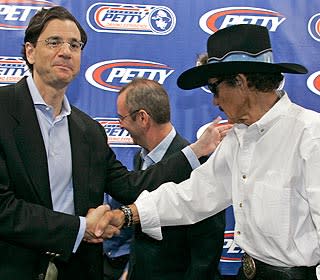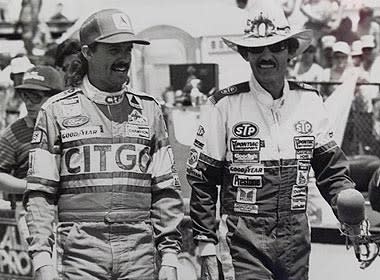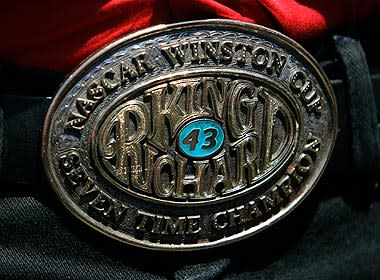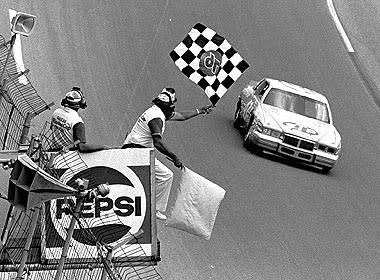Forever The King
JOLIET, Ill. – He is quite simply, The King. He needs no other introduction.
For half a century, Richard Petty has been the face of NASCAR. And while the France family may have founded the sport, it's Petty who gave NASCAR its engines and wheels.
In the 50 years since his very first race, which came on July 12, 1958 at Columbia Speedway in Cayce, S.C., Petty set a standard that likely will never be equaled. He won 200 races, a record that will stand forever, went to victory lane seven times in the Daytona 500, which is three more than anyone else, and became the first driver to win seven Cup championships.
The gangly kid from blue collar Randleman, N.C., wasn't born into royalty. He earned it, so much so even his son Kyle calls him "The King" more often than "Dad."
Now, at 71, Petty and his trademark cowboy hat and wraparound sunglasses is as recognizable as he was back when he was winning races, the last of which came in 1984.
Quite simply, he's an American icon.
"I've survived these years I guess more than anything else," said Petty, who followed in the footsteps of his father Lee, a champion in his own right. "You look back over the history and stuff, and I come along (with) the history.
"I think I was 10 years old when I ran my first race, and I went to the very first Cup race they had in 1949 in Charlotte with my father when I was like 11 years old. So I've been there ever since NASCAR started, basically, and I just came along at the right time to grow up with NASCAR."
And seen it he has, from both sides of the spectrum.
As a driver and an owner, Petty has won more races than anyone. Not even the most dominant team in the sport today, Hendrick Motorsports and its 169 wins, compares to Petty Enterprise's 268.
But while his legend and legacy is in tact, Petty the owner has struggled to keep up with the changing times. Since The King's last victory, the organization has just three wins and none since 1999.
"It hasn't been easy," Petty said earlier this year. "We've done the best we can with what we have. It hurts not to be as competitive as we once were, but we're working hard to get Petty Enterprises back to that level."

Richard Petty sold controlling interest of Petty Enterprises to Boston Ventures. David Zucker will now run Petty's organization.
(AP photo)
Just one month ago, Petty made maybe the most difficult decision of his career, selling controlling interest in Petty Enterprises to a private equity firm.
While it was a difficult decision to give up majority control of the company his father started 59 years ago, Petty is at peace with himself.
"We did what we had to do to survive, plain and simple," Petty said.
Becoming The King
A veteran of 1,185 career NASCAR starts, Petty cut his teeth on tracks that dotted the South and Southeast, many of which are nothing more than a distant memory today.
From Augusta to Greenville to Hickory to Weaverville to Winston Salem, Petty's career is a road map of racing whenever and wherever he could – sometimes as many as 60 races or more in a single season.
While he enjoyed his greatest success at still-kicking Martinsville and now-defunct North Wilkesboro, winning 15 races at each track, no track embodied Petty's career like Daytona International Speedway.
It was on the high banks of Daytona where Petty took the green flag 74 times, winning 10 races, with 28 top-five and 37 top-10 finishes. Do the math and he wound up in the top 10 every other time he raced at the 2.5-mile behemoth.
He also saw his father win the first Daytona 500.
"I grew up with Daytona," Petty recalled. "The very first 500 there was in 1959, but there weren't that many superspeedways so we went to Daytona to run the race. And it wound up being really great for my career from the standpoint that Daytona was just getting started. I was just getting started, and as Daytona grew, I was fortunate enough to win some races there and I grew with it."
It was at Daytona where Petty established a tradition not only of winning – seven of his 10 career victories there were in the prestigious 500 – but also of establishing a tradition for all drivers who ever won there: that of a Daytona champion.
No matter how bad your season might be overall, if you won at Daytona, you proudly could hold your head high knowing you were the best of the best in one of the most grueling races in the sport.
"When you win Daytona, you win it all year long whether you ran any more races or not," Petty said. "Everywhere you went you were introduced as a Daytona 500 winner, and that has made it work really, really good for me.
"I was able to win races and win championships; I was still winning some Daytona races, and it just grew together. So I think the history of Daytona and Richard Petty kind of go side-by-side."
The King, the man
Petty is a picture of respect and genteel, old school attitude. He has changed very little from when he was 21.

Richard Petty and his son Kyle followed in the footsteps of Lee Petty, who won the very first Daytona 500.
(AP photo)
He still calls people "sir" and "ma'am," signs every scrap piece of paper and poses for every photo with fans. He carries himself with dignity and modesty.
One of the highest compliments ever paid to Petty came from an unlikely source, but it capsulizes who the man is in the most basic terms.
"Richard Petty is a Southern gentleman in the truest sense of the word," former President Ronald Reagan once said.
Sure, Petty could be different. He could be brash, cocky, even boisterous. After all, he is a 200-race winner and seven-time champion.
Hell, he is Richard Petty.
But the beauty of Petty is that he still is the same person father Lee and mother Elizabeth raised. He has held true to their values of honesty, hard work, fairness and, perhaps most importantly, modesty.
"I never sat there and said, 'Look what you've done or look what you've been able to accomplish,' " he said.
Instead, he hearkens back to his upbringing. His parents wouldn't let success go to his head, and to his credit, Petty never did. He just was a guy who had a few more lucky breaks than the next guy.
"Anybody's bad luck is somebody else's good luck," he said. "I always look at it that way. This is one of my daddy's deals – no matter how hard you work, you have to work for it, and you always figure that you're going to get the pluses out of it.
"The one thing that my dad said is that if you work hard, you can overcome a hell of a lot of obstacles in the world except fate, and fate you have nothing to do with."
Respected like no other
Petty is still a driver favorite.
Even though his organization is nowhere nearly as successful as Hendrick, Childress, Gibbs and others, a quick run through the Cup garage shows the respect Petty still commands to this day.
Matt Kenseth: "When you first heard about stock car racing, you heard about Richard Petty. I remember when I won my championship in 2003, it was the last Winston Cup championship, and he was the first Winston Cup champion. He'd always talk to me and give me a lot of little tidbits of advice. He's always been a great ambassador for the sport. He's never not had time for the fans or a sponsor. He's always been very engaging, easy to get to and just an all-around great guy."
Mark Martin: "I was in awe of Richard Petty from my first introduction as a little boy from Arkansas. He's always been very down to earth and is one of the most instrumental in NASCAR being where it is today. For all of us being able to do what we do has a lot to do with what Richard Petty did. The first time I really raced with him and passed him, I thought that was something."

The belt buckle says it all – King Richard, seven-time Winston Cup champion.
(AP Photo)
Kasey Kahne: "I grew up watching NASCAR racing. I knew Richard Petty as a driver on TV. I knew how good he was and what he had done in the sport. My parents' first Daytona 500 that they went to was not one of his better days. It was the one where he flipped down the fence, and it was right in front of my Mom. She would tell me that story for a long time on how crazy it was. So things like that, I know what an awesome race car driver he was."
But perhaps the most poignant observation among today's drivers came from Jeff Gordon. It was Nov. 15, 1992 that Gordon made his first career Cup start – and Petty made his last.
Although no one back then could have predicted such, that afternoon at Atlanta proved to be an unofficial passing of the torch from one legend to another.
"To me, one of the biggest impacts Richard made to me was in that race at Atlanta," Gordon recalled. "I'll never forget standing on top of the trailer in the garage area watching practice, and I remember Richard walking through the garage and signing every single autograph, every person. He was mobbed, and it was just unbelievable that weekend the number of people that were surrounding him. He was so generous and nice, just trying to do everything he could for every person.
"I didn't get the opportunity to race wheel to wheel with him. Certainly, that was the only race I ever competed with Richard Petty, and we both kind of went up in a ball of flames.
"To me, it's the example that he set with the drivers as to how to be fan-friendly, how to represent the sport, how to compete and be at the top of the game – and he sets the bar in every category. It's more like history and looking at the stats, and I had that one moment of that race that weekend to recognize his involvement with the fans."
An icon to admire
Without question, the two biggest names in NASCAR history are Petty and Dale Earnhardt.
That synergy is especially important to Dale Earnhardt Jr. While his father was a larger-than-life figure, Petty was – and still is – an even more looming persona.
"Richard is a huge icon in the sport," the younger Earnhardt said. "For him to still be as accessible as he's been, if you're in the garage and around the sport every weekend, he's there. A guy of his age and with what he's done in this sport doesn't necessarily have to be in that position, but he tends to still maintain a very visible persona."
"When he talks to you, it really makes you feel good. It really gives you a good feeling when he says 'hey' to you, acknowledges you. It means a lot to me when he does that."
Current Sprint Cup points leader Kyle Busch is only 23. He was in second grade when Petty ran his last race.
But like older brother Kurt, Kyle Busch is a dedicated student of the sport's history and waxes effusive over what Petty has meant to it over the last five decades.
"He's been a huge part of this sport, probably if not the biggest, one of the biggest guys that's really built NASCAR racing over the years," Busch said. "I really cherish the opportunity to have met and to have known Richard.
"You look at guys like Cale Yarborough, David Pearson and the other guys, you love looking at the things they've done, but they don't come to the race track all the time. Richard does. He's still here, man. He's still here and loves his fans. He's really somebody to look up to."
The King, The Man, The Legacy
Even with all the accomplishments in his career, you never will hear Petty toot his own horn.

Richard Petty's last win came in 1984 in the Firecracker 400 at Daytona International Speedway.
(AP photo)
Ask him if one achievement stands out more so than another and he demurs from being specific. Rather, he answers the way he lives life: simply and honestly.
"Just being here I guess," he says. "If you looked at all of those wrecks I ran over a period of 35 years or whatever.
"I tell everybody, when I won my very first race, I said nothing will ever be this big. But then you get fortunate enough to win more and more, and over a period of time it gets diluted.
"I do know that when I sit around and talk about it or listen to people or whatever, the ones that got away are the ones that you really worry about and you say, 'We should have done better in this race or that race.' So those are probably in your mind more than the ones that you won."
It's the same way with how Petty would like to be remembered in NASCAR history. He doesn't want to be known simply as a great driver or a multiple champion.
"The main deal is that they remember you, whether you were good, bad or whatever," he said. "If you were remembered, then that's about all you can expect."
Press him a little more, and he still doesn't bite.
"I just think I was a lucky son of a gun to be born at the right place at the right time under the right circumstances, with a little bit of talent and a lot of talented people around me to put me in a position to be where I'm at today."
And that's why he's the one and only King.
